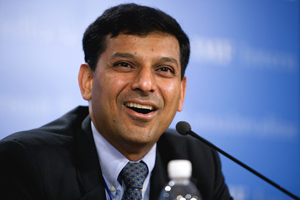Kochi, Feb 14: Why the humble Dosa -- the South Indian dish loved by all -- continues to cost high when RBI is claiming a victory over inflation? Governor Raghuram Rajan blames lack of technology upgrades from its traditional 'Tawa' preparation and high wages of the person making it!
'The technology for making Dosas hasn't actually changed. Till today that person puts it (Dosa batter) on Tawa, spreads it around and then takes it out, right? There has been no technological improvement there.
"However, the wages that you are paying to that gentleman, especially in a high-wage sort of state like Kerala, are going up all the time," Rajan said.
The RBI Governor was replying to a question from a Dosa- loving engineering student at a Federal Bank event here last night.
"In real life, I have a query on Dosa prices -- when inflation rates go up, Dosa prices go up, but when inflation rates are lower, the Dosa prices are not lowered. What is happening to our beloved Dosa, sir?" she asked. Rajan replied that the workers can be used in many productive areas where productivity has gone up such as factory works, banking where today that same bank clerks service many more people because of technology.
"So, what happens is that in an economy which is growing and when there are sectors which are improving technologically while other sectors are not improving their technology, the prices for the goods manufactured by sectors, that are not improving their technology, will go up faster.
"You are seeing it in the case of Dosa," Rajan said.





Comments
Add new comment